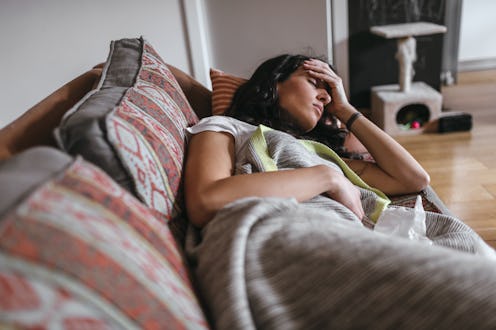Life
What It’s Like To Live With A Period-Linked Mood Disorder During The Pandemic

My period came on time this month, which was a surprise. What wasn’t a surprise, however, was the return of all of the symptoms — paranoia, anxiety, drowsiness, aching boobs, brain fog, and extreme restlessness — that I get when I’m having a premenstrual dysphoric disorder (PMDD) flare-up. PMDD is a mood disorder that feels like the most extreme premenstrual syndrome (PMS) to the point of suicidal ideation. Like many people living with PMDD, I have coping mechanisms that help me manage it. But with the arrival of COVID-19 and my state's shelter in place order, they all went out the window.
Outside of these "unprecedented times," I use a combination of Prozac, regular exercise, eating (relatively) balanced meals, avoiding added sugar, and not drinking much to keep my symptoms in check. Since the shelter in place order, my meals are more strongly influenced by which cans I haven't opened yet than what's on the food pyramid, and my regular walks outside have been replaced with anxious pacing around my living room. I quickly learned that my pandemic coping mechanisms run exactly opposite to the ways I deal with PMDD: I’m eating chicken nuggets and mac and cheese like a five year old, drinking too much, not exercising enough, and spending days without leaving the house. As a result, this menstrual cycle featured two weeks of rollercoaster emotions, aching breasts, disrupted sleep, and irritability.
“The current global pandemic and the significant impact this is having on everyone's lives and sense of wellbeing would likely cause an exacerbation of symptoms for people with PMDD,” Dr. Andrea Chisholm, M.D., an OB/GYN and expert in PMDD, tells Bustle. “The sense of uncertainty, loss, and fear and the social isolation and disruption of routine are even significantly impacting people who do not have a preexisting mood disorder. People with PMDD or other mood disorders are especially vulnerable during this time.”
Brett Buchert, the director of care and support at the International Association of Premenstrual Disorders (IAPMD), has been able to largely maintain the self-care routine that keeps her symptoms in check. But even with regular therapy, eating balanced meals, and continuing to exercise, she’s had a rougher month than usual.
“When my ovulation days hit, I was sobbing,” Buchert tells Bustle. “I felt like I wasn’t even upset about anything in particular — I was just so upset. I think it was because there’s been so much stress, for me and for the world, and that needed to come out.”
One of Buchert's roles at IAPMD is providing peer support to other people with PMDD. This month, she says there's been a noticeable uptick in members who reached out for help.
“I was speaking on peer support with a single mom with two small children,” Buchert says. “When her symptoms come, she usually takes them to the park and lets them play so she can break down in the car. That’s very relatable — that’s what happens. But it’s just not available to her right now. So what does she do? Not having those things that get us through the worst moments can be really scary.”
Mar, 33, has found that mandated social distancing has actually eased her symptoms. "I am an introvert, so social distancing is actually helping me keep grounded," Mar tells Bustle. "I live with people I love who also understand the illness, so I do not have to pretend that I'm OK. And that gives me peace." While she usually experiences extreme emotional and physical effects during the luteal phase of her cycle, this month she says she only had two days of hypersomnia (extreme drowsiness) and poor physical coordination.
For me, the main goal is to get back to my typical PMDD-helping habits— at least the ones that are still viable while social distancing — as soon as my period is over and my estrogen starts to rise again. I’m also reminding myself that even though we all keep talking about the “new normal,” this is not my new normal.
“It’s helpful for me to know that this is a difficult time, so it makes sense to me if I feel worse than usual,” Buchert says. “We have to give ourselves some grace. We’re still doing well — and we’ll recover.”
If you or someone you know is seeking help for mental health concerns, visit the National Alliance on Mental Illness (NAMI) website, or call 1-800-950-NAMI(6264). For confidential treatment referrals, visit the Substance Abuse and Mental Health Services Administration (SAMHSA) website, or call the National Helpline at 1-800-662-HELP(4357). In an emergency, contact the National Suicide Prevention Lifeline at 1-800-273-TALK(8255) or call 911.
Experts cited:
Dr. Andrea Chisholm, M.D., an OB/GYN and expert in PMDD
Brett Buchert, director of care and support at the International Association of Premenstrual Disorders (IAPMD)
This article was originally published on